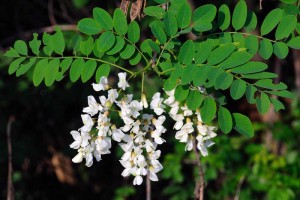Robinia pseudoacacia, also known in its native territory as black locust, is a tree native to the southeastern United States, but has been widely planted and naturalized elsewhere in temperate North America, Europe, Southern Africa and Asia and is considered an invasive species in some areas.
Contents
Uses
- In traditional medicine of India, different parts of R. pseudoacacia are used as laxative, antispasmodic, and diuretic.
- The wood of Robinia pseudoacacia tree is very strong and also durable. The wood is therefore used for making fence posts and railroad ties. It can also be used to make an efficient fuel. Due to its quick growth, the black locust is also used by environmentalists to regulate soil erosion.
Benefits
- Various parts of the Robinia Pseudoacacia tree have different uses. They can be used to purify the body, cure spasms and encourage proper flow of bile. Some of the well known health benefits and therapeutic uses of black locust are as follows;
- The blossoms of Robinia Pseudoacacia are known for their diuretic, emollient and anti-spasmodic properties. Some also consume cooked flowers to relieve eye problems. The flowers are even known to contain a chemical which may help to combat tumors. The crushed flowers help in healing of the skin after burns. They may be applied to the affected area and left on for a couple of hours.
- A beneficial infusion can be prepared with a teaspoonful of Robinia Pseudoacacia flowers and a cup of water. Drinking this after meals helps to alleviate burning in the stomach and is helpful for people with gastritis.
- Hot Robinia Pseudoacacia tea helps in treating cough, sore throat, bronchitis and asthma.
- Add lime flowers to an infusion of Robinia Pseudoacacia flowers to prepare a relaxing remedy for mental fatigue and nervousness.
- The inner bark and root bark of the Robinia Pseudoacacia helps to remove waste from the body. The root bark is sometimes chewed to induce vomiting. It may also be placed in the mouth to cure a toothache.
- The fruits, berries and seedpods are used as an analgesic due to their narcotic properties.
- The leaves of Robinia Pseudoacacia are known to improve secretion and flow of bile. The juice obtained from the leaves may also help to fight against viruses. The dried leaves may be used to heal burns and wounds.
- Robinia Pseudoacacia seeds are usually boiled to reduce the bitterness and then consumed. The seedpods may also be eaten as they contain a sweet pulp. The seeds are known to be rich in nutrients.
Cautions
- Consult a doctor before consuming it.
Interactions
- Necessarily talk to your doctor or pharmacist before combining it with other medicine.
Other names
Black locust, acacia blanc, robinier faux-acacia, false acacia, robinia, white acacia, yellow locust, valse acacia, honey locust, locust tree, white locust, acacia locust
References
Source: Wikipedia, https://en.wikipedia.org/wiki/Robinia_pseudoacacia
Home Remedies for You, http://www.home-remedies-for-you.com/herbs/black-locust.html

